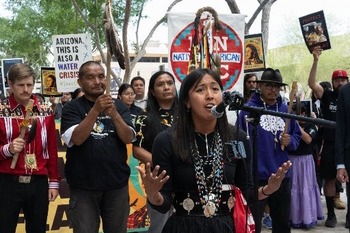-
 August 22, 2025By Kate Scanlon, OSV NewsWASHINGTON (OSV News) -- A federal appeals court temporarily blocked Aug. 18 a federal land transfer to a copper mining giant that would lead to the destruction of a site considered sacred by Indigenous peoples. But President Donald Trump said Aug. 19 his administration would continue to pursue that land transfer.
August 22, 2025By Kate Scanlon, OSV NewsWASHINGTON (OSV News) -- A federal appeals court temporarily blocked Aug. 18 a federal land transfer to a copper mining giant that would lead to the destruction of a site considered sacred by Indigenous peoples. But President Donald Trump said Aug. 19 his administration would continue to pursue that land transfer.
In an Aug. 18 temporary restraining order, the 9th U.S. Circuit Court of Appeals blocked the transfer of a piece of land containing Oak Flat in Tonto National Forest to Resolution Copper, a foreign-owned mining company, while the lawsuit proceeds.
In May, the U.S. Supreme Court rejected an appeal from a coalition of Western Apache people, along with other Native American and non-Indigenous supporters, that argued the destruction of Oak Flat would place a substantial burden on their religious practice in violation of the Religious Freedom Restoration Act.
In a dissent, Justice Neil Gorsuch, joined by Justice Clarence Thomas, argued the court made "a grave mistake" in declining the religious freedom case, saying it met their standards for hearing the appeal.
But the new ruling came in response to a lawsuit from groups, including the San Carlos Apache people and other Native American nations, challenging the land exchange on environmental grounds.
An environmental impact report for the project mandated by the National Environmental Protection Act estimated that mining the site would result in a crater nearly 2 miles in diameter and about 800 to 1,000 feet deep.
Oak Flat -- about 70 miles outside of Phoenix -- is considered a sacred site by the region's Indigenous peoples and is on the National Register of Historic Places. However, after the discovery of copper deposits on the land, in December 2014, Congress authorized the U.S. Forest Service to swap the land for other sites with Resolution Copper and lifted a mining ban on Oak Flat, known by the Apache as Chi'chil Bildagoteel.
Witnesses at the inaugural meeting of the Department of Justice's Religious Liberty Commission established by Trump on June 16 listed the potential destruction of Oak Flat as among key religious liberty challenges facing Americans, with some even criticizing the land transfer itself as a bad deal.
But Trump appeared undeterred, writing in an Aug. 19 post on his website, Truth Social, "A Copper Mine in Arizona, 'Resolution,' was just delayed by a Radical Left Court for two months -- 3,800 Jobs are affected, and our Country, quite simply, needs Copper -- AND NOW!"
"They are looking to do an Expedited Appeal before the Ninth Circuit, but it is so sad that Radical Left Activists can do this, and affect the lives of so many people," Trump wrote. "Those that fought it are Anti-American, and representing other Copper competitive Countries. We can't continue to allow this to happen to the U.S.A.! The Appeal will take place, shortly, in the Ninth Circuit."
Trump has sought to boost U.S. copper production through his trade policy, including implementing tariffs, or taxes on imported goods, to spur U.S. mining.
In response to Trump's post, Terry Rambler, chairman of the San Carlos Apache Tribe, contested that the president was misled by misinformation from foreign-owned mining interests, naming China as one of them.
"This proposed mine is a rip-off, will destroy a sacred area, decimates our environment, threatens our water rights, and is bad for America," he wrote on Facebook.
Rambler said he would be "willing to sit down with the Trump administration and provide factual information to protect American interests."
In a statement, a spokesperson for Resolution Copper said, "This is merely a temporary pause so that the court of appeals can consider plaintiffs' eleventh hour motions, which were submitted on Saturday afternoon asking for a ruling by Monday. We are confident the court will ultimately affirm the district court's well-reasoned orders explaining in detail why the congressionally directed land exchange satisfies all applicable legal requirements."
Wendsler Nosie Sr. of Apache Stronghold, the non-profit representing the Apache-led coalition in the previous lawsuit, said in a statement, "Our nation cannot survive if we sacrifice what is sacred in pursuit of temporary profits."
"President Trump said he wants to destroy our holy ground of Oak Flat so a foreign-owned corporation can send copper to China," he said. "Whether you're Republican, Democrat, or neither, that is a terrible deal for the American people. But this fight is much bigger than politics or profit. This is a fight about our identity as a nation. Do we respect religious freedom? Will we safeguard our environment for our children and grandchildren? Or will we sacrifice it all for corporate greed?"
Nosie added, "We're grateful that we've been joined in our struggle by people of many faiths -- Catholics, Protestants, Muslims, Jews, and more -- and people of every political persuasion. That's because this is not a partisan issue. It is a moral one."
In the Apache Stronghold lawsuit, the U.S. Conference of Catholic Bishops, the Knights of Columbus, and Notre Dame Law School's Lindsay and Matt Moroun Religious Liberty Clinic were among the religious groups that filed friend of the court briefs, also known as amicus briefs, in support of Apache Stronghold.
Several of the group's supporters from a range of religious organizations argued the case had implications for the scope of the Religious Freedom Restoration Act, arguing lower courts improperly narrowed its interpretation in the case.
